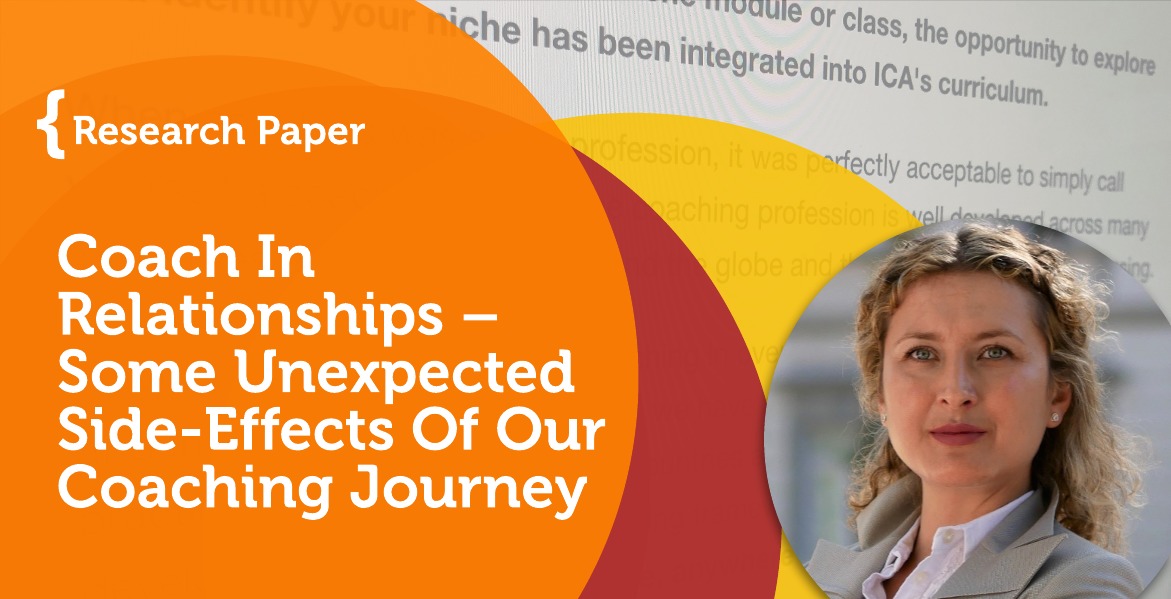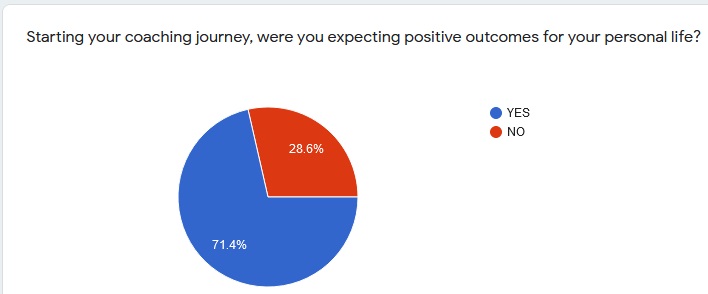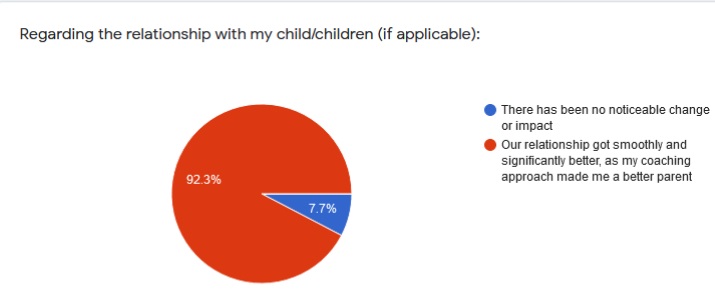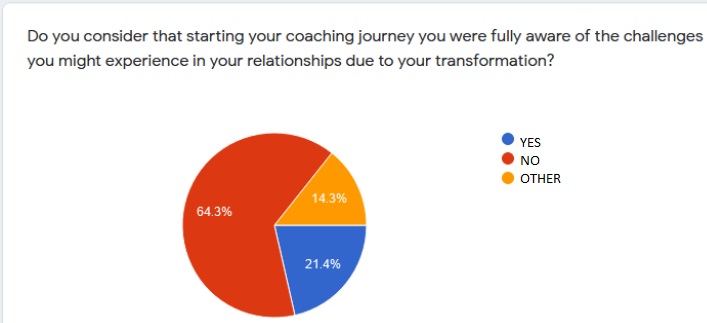 Research Paper By Patrycja Sałacińska-Kone
Research Paper By Patrycja Sałacińska-Kone
(Transformational Coach, POLAND)
I. Introduction – where is this topic coming from?
“How could becoming a coach affect our private relationships?” An easy question, isn’t it? After all, being trained and practicing better listening and a deeper understanding of other humans we should naturally be able to become a better friend, a better partner, a better colleague, and also a better parent. And this should inevitably lead to improvement in our relationships and, as a consequence, to more harmony and happiness in those…
As logical as it might sound at the first glance, my personal experience of unexpected developments in my personal relationships led me to think deeper and actually question this initial assumption. I started to ask myself:
Besides unquestionable blessings and benefits, what could be the adverse side-effects (a “toll”) of a deeper listening and understanding of people around us?
While the advantages of our improved listening skills, higher self-awareness, and deeper understanding of others are broadly discussed and rather obvious, my research presented below aimed to explore the potential difficulties we, as coaches, actually face, due to this enormous and relatively rapid transformation that for many of us the coaching training and practice is.
II. Does our experience confirm this initial assumption we probably all have?
When I started to dig deeper – asking myself, conducting some online research, and then eventually interviewing my peers – I became curious. The intuitive and initial answers were mostly positive (or neutral), as can be seen on the following graph[1]:
 Yet in the stories of my peers so often this initial immediate answer was followed by some “however”…
Yet in the stories of my peers so often this initial immediate answer was followed by some “however”…
Then it became even more intriguing, as from this initial, seemingly insignificant side-comment more and more interesting stories were revealed and actually some significant events and facts were acknowledged.
When I did not find any articles or online materials that would actually touch this topic[2], I became even more intrigued. Is it our (as coaches) natural tendency to focus on the positives and overcome the difficulties rather smoothly and not dwell too long on the roadblocks? Or are those interesting cases I heard about (and experienced myself) only an insignificant “coincidence”?
That’s when I decided to conduct my little inquiry (both interviewing some of my peers directly and through a little anonymous online survey). As a result, the following considerations, examples, and conclusions are based partly on my own and broadly on the experience of around 30 other coaches of different backgrounds, nationalities, and personal and professional situations who kindly shared with me their thoughts and stories.
DISCLAIMER: Being a lawyer, for the avoidance of any doubt I would like to point out at this point that I am by no means saying that the below presented potential unexpected adverse side-effects of our coaching journey cannot be overcome or should stop anybody from starting this amazing new life chapter and calling! We all actually do overcome it, finding our way to deal with it, and actually in most cases just grow, as a result of those challenges. Beyond any doubt in general our relationships become deeper, more precious, supportive, and wiser. Just not always with the same people that were in our life before we entered this new realm. And if with the same people, often after a deep transformation of the previous dynamics.
Therefore, the goal of this Research Paper is not to discourage anybody, but simply to acknowledge those lessons that might be there for us to be learned, as we might have not intercepted all of them when we were enrolling in this (beyond any doubt amazing!) coaching journey.
III. Before we start – a special case of parenting.
The results of my research regarding parenting are so straightforward that it seems better to basically exclude them from further considerations. This is because, in the vast majority of cases that I researched and analyzed, the coaches report undoubted improvement of the relationships with their children, as can be seen on the following graph[3]:
 As my research showed, we might encounter some initial struggles and some slight opposition (especially in the case of teenagers) to our new approach; however, ultimately our improving coaching skills (deep listening, exercising non-judgment and open-ended questions, instead of a more “traditional” master-child kind of attitude) seems to be just what is needed to actually significantly improve the relationship with our children – both in the short and long-term.
As my research showed, we might encounter some initial struggles and some slight opposition (especially in the case of teenagers) to our new approach; however, ultimately our improving coaching skills (deep listening, exercising non-judgment and open-ended questions, instead of a more “traditional” master-child kind of attitude) seems to be just what is needed to actually significantly improve the relationship with our children – both in the short and long-term.
Are we really inevitably becoming a “better” friend, partner, and/or colleague thanks to our coaching journey?
Firstly, I decided to challenge the assumption that training ourselves to listen better and have a deeper understanding of ourselves and others “inevitably” leads us to the improvement of our own “performance” in our interactions with other people outside of the coaching session.
Some traps are quite easy to be spotted. More often than not, at the beginning of our journey we are so excited and thrilled with our broader knowledge that we feel like now we can just tell others what they should do to improve their perspectives/underlying beliefs and as result their quality of life in general. Fortunately, having proper training (like the one we receive in ICA) most of us understand very early on that this is NOT the way J.
So…instead of “telling” people around us how they should change themselves, we start to coach them! It is so tempting to try our newly acquired skills in our proximate environment, isn’t it? And here we might encounter all the range of reactions: from gratitude (rather rarely and if so, only initially), through slight irritation and subtle comments to stop coaching them, up to strong opposition. Most of us learn rather quickly that to coach our immediate environment we need permission – and this is granted on particular occasions rather than daily J.
As understandable as it is, only we know how challenging it is for us to not put the coaching hat on when we so clearly see, how a person dear to us could benefit from some coaching…yet is not open or ready for that. We see the issues more clearly and being empathetic beings with a strong will to support people around us, we actually literally suffer! Not being able and/or allowed to help them. That for me is the first “toll” to be paid as a coach:
Toll #1. We might have to learn to accept watching people we care about suffering because of issues we know could be solved…and yet not be able/allowed to support them in this.
It feels a little like being a doctor with a bag full of helpful medicines, surrounded by people who so clearly (according to us) could benefit from them, who are not willing to take them, or even hear from us that they might have some condition that could be potentially treated (if not by us, be it by some other professional).
Our parents – another special case.
Continuing the metaphor of a helpless, and therefore suffering doctor, I wanted to touch something that I would call Mount Everest of this challenge – namely the relationship with our parents… One could say that it is yet another level of mastery, a level that we could with no exaggeration call a “black belt” of coaching J.
While with our colleagues, friends, and partners we might at some occasions support them by coaching them a little and they might even appreciate such support (once again – usually occasionally, on a punctual issue and with explicit permission), this is even more rarely the case with our parents.
The transition from us being their children (to be guided and advised in some cases, or literally told what to do in others), to us being independent adults and as such, partners in any conversations and life issues is already challenging sometimes. In other cases, even if our parents do not have a problem with giving up on their parental influence, it is not easy for us to see our parents as humans who are suffering because of their internal limitations and beliefs.
And here we are – standing with the bag full of medicines and solutions, next to the beings that we so deeply care about…yet helpless, as for them accepting to be coached (explicitly or implicitly) by their own children is not particularly natural or comfortable. Their age of course is usually not making it easier, as an idea of questioning the beliefs according to which they have lived their entire life until now seems to be sometimes a “mission impossible”.
Does being a “better” friend, partner, and/or colleague ourselves necessarily lead to improvement of the relationship?
Leaving aside the initial tensions when we go around trying to coach everybody in our life (or even worse, revealing to people what underlying beliefs they have – according to us – and how they should see things instead), the interesting part starts when we actually do manage to support others better…and realize that it does not necessarily serve us reciprocally.
Let’s say eventually, step by step, we do listen better. We do understand others’ struggles better. We give others space when they speak and support them in processing their situation. We do limit the default “advice-giving mode” and expand our capacity to support others in developing their own solutions. Eventually, we are more and more skilled in seeing the person, more than the problem.
But what about the US? Our struggles and our need to be heard? We need to be listened to and be given space to process, instead of receiving immediate advice and somebodies’ solution to our problems?
Starting from the fact that many of us realize how bad people are at listening to others in general. We see it so clearly, when (or better said: how often) people do not listen to others at all. When it happens with our colleagues or mere acquaintances we might simply smile, give thanks for the unsolicited advice, or walk away and get over not being heard or even listened to at all.
However, when it is our partner or a dear friend whose support we actually seek, the disappointment, lack of deep understanding, and eventually a painful feeling of loneliness might be a very unpleasant adverse side-effect of us transforming. We have discovered, observed, and experienced the amazing power of coaching – what could be “bad” about that? The answer, which takes many of us by surprise, is:
Yes, we did discover the amazing power of coaching. However, the rest of the world around us did not J
In the past, others’ immediate advice and solutions we might have even considered helpful. At least for a while, as we all know why others’ solutions have rather limited use and value. However now, knowing the power of coaching, it might be simply annoying and mostly not helpful at all. As a result, not unrarely coaches withdraw from sharing their struggles with their close friends or partners – as more often than not, it is an easier path than trying to explain to a non-coach partner or friend that their well-meant advice is not welcome.
As much as people cannot be blamed for not being coaches (nobody is perfect after all J), coaches have to find their way to soothe themselves in this feeling of disappointment and some loneliness. This can be described as a potential Toll#2 of our coaching transformation:
Toll#2: We must learn to deal with this feeling of disappointment and lack of understanding from our closest people.
Then we also need to find new ways of addressing our struggles and obtain the support that we need. Here our new peer coaches are certainly a great source of support that we can many times so greatly count on.
And here we arrive at the most serious “however” that I have encountered in my research. Many of the coaches sharing with me there or their peers’ stories actually acknowledged that they had to redefine some long-term friendships – discovering that they felt too one-sided, i.e., the coach felt that they were being supportive and giving, but did not receive reciprocal support at all. Some of the friendships actually needed to be let go or at least transform into much less meaningful relations.
I many cases similar processes applied to coaches’ partners. In principle, it seems that there are only two possible scenarios when coaches’ partners are concerned. First, they might actually transform themselves and the relationship needs to find new ways of communication – which of course can be healing and very nutritive for the relationship. However, in other cases, the partner might not be willing or able to change. And here a coach faces an important decision, what to do with such relationship, knowing that their own transformation will most likely rather only go deeper and such lack of a real understanding and (so needed) support might be unsustainable in the long-term. And this leads us to a potential Toll#3:
Toll#3: Our closest relationships might need to go through a deep, not always pleasant transformation. As a result, some friendships and/or partnerships/marriages might actually need to be let go.
How coaching our friends serve us in a long term?
Finally, another type of challenge we might encounter when we actually agree with our dear friends that to support them better in their struggles (and get some more practice on our side) we become their actual proper coach for some time.
The tricky part is that the better we are at that, the more we actually assume this role and our friend might actually start seeing us more and more as their coach and supporter, forgetting that we might actually need some support ourselves sometimes. Having a friend who is a helpful coach and provides us free coaching regularly is a great asset…for the coachee.
In such instances, we tend to focus on the challenge of stepping out of the friendship mode and being professional as a coach. However, the better we are at that, the more stepping out of the coaching relationship and coming back to friendship mode might actually be a challenge, for both sides. A coachee might actually be even “unpleasantly surprised/disappointed” that their “coach”, who seems to be so strong and supportive for them in their struggles, might actually be struggling themselves and need support too. On the other side, the more successfully a coach assumes their role, the more they might struggle to show vulnerability and ask for support from their “coachee” (who outside of the session is supposed to be their friend). This led me to define a possible Toll#4:
Toll#4: Regrettably, we might be forced to choose between:
- a) becoming a skillful and supportive coach to our friends, but losing them as friends; and
- b) regrettably giving up on coaching them entirely and coming back to the reciprocal friendship.
Having said that, we should obviously add that surely we might be able to navigate this challenge and find the right balance. A lot depends also on the maturity of the other party in such a relationship.
Nevertheless, it turns out from my research that it might be an unexpected and quite challenging process, not always pleasant and it might actually put some friendships to such a test that some of them simply do not survive.
VII. Conclusions
To conclude, my own coaching journey so far and the research I have conducted (and will surely continue) have brought me to discover that along with so many (!) beautiful gifts that this new life path brings to our life (including new, amazing, meaningful and so deep and supportive friendships with our peers), there are also some challenges and actually also some suffering that we might have to go through.
As I pointed out in my disclaimer above, this is not a reason to reconsider following our calling. I simply felt that many of us might have not been fully aware of those potential adverse side-effects and This is shown on the following graph[4]:
 My observations led me to the idea that this topic might be worth looking at. Following the experience of entering the psychotherapeutic studies, where students are actually warned about potential risks of the profound transformation they are about to go through, I would advocate asking any candidate for a coaching training the following question:
My observations led me to the idea that this topic might be worth looking at. Following the experience of entering the psychotherapeutic studies, where students are actually warned about potential risks of the profound transformation they are about to go through, I would advocate asking any candidate for a coaching training the following question:
Are you ready to take the risk of significant changes in your private relationships, including some potential break-ups or a need for total and not necessarily pleasant transformation?
Again, not because it would (nor should) stop anybody from commencing this adventure – simply to maybe make them somehow cautious and attentive if some unexpected adverse side-effects appear and have to be addressed.
Resources
[1] The online anonymous survey: “Your private relationships – how has your coaching journey affected them?” created by the author of this Research Paper and available at: https://docs.google.com/
[2] This is why this research paper does not refer to any articles and is instead based on my direct interviews with my peers and responses of coaches to an online anonymous survey that I conducted.
[3] Ibidem p.2.
[4] Ibidem p.2.